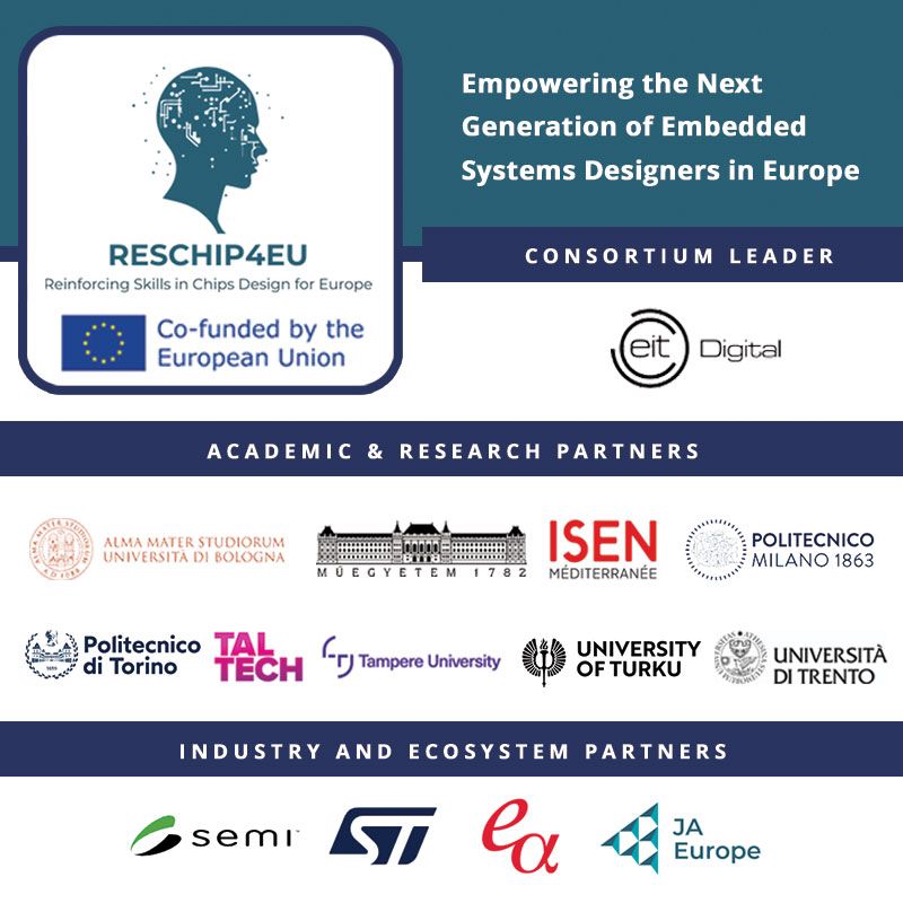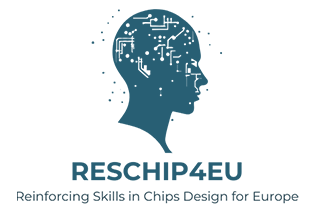News & Events
Meet the RESCHIP4EU Partners
12 June 2024
The RESCHIP4EU project, led by EIT Digital strengthens EU higher education in embedded systems design - covering the full stack from silicon and System-on-Chip (SoC) design to safety-critical platforms and application software. The project kick-off in June 2024 in Brussels. Here are the consortium partners of the project:
Consortium Leader EIT Digital (www.eitdigital.eu) - A European leader in digital innovation and entrepreneurial education.
Academic & Research Partners:
- Alma Mater Studiorum - Università di Bologna (www.unibo.it) - Renowned for excellence in engineering and embedded systems.
- Budapest University of Technology and Economics (www.bme.hu) - Leading engineering and tech research in Hungary.
- ISEN Méditerranée (www.yncrea-mediterranee.fr) - French engineering school with expertise in electronics.
- Politecnico di Milano (www.polimi.it) - Leading polytechnic university at the forefront of chip design and innovation.
- Politecnico di Torino (www.polito.it) - Historic university driving ICT and microelectronics research.
- TalTech – Tallinn University of Technology (taltech.ee) - Estonia’s top university in ICT and embedded systems.
- Tampere University Foundation (www.tuni.fi) - Renowned for embedded and intelligent systems research.
- Turun yliopisto - University of Turku (www.utu.fi) - Combines academic excellence with digital systems research.
- Università di Trento (www.unitn.it) - A rising leader in computer science and embedded intelligence.
Industry and Ecosystem Partners:
- SEMI Europe (www.semi.org) - The global industry association for electronics manufacturing.
- STMicroelectronics (www.st.com) - Global semiconductor company in embedded electronics.
- Evolutionary Archetypes Consulting SL (ea.consulting) - Experts in education, communication, and dissemination.
- JA Europe (www.jaeurope.org) - Largest European NGO promoting entrepreneurship and STEM education.
Learn more about RESCHIP4EU: https://www.eitdigital.eu/eu-collaborations/reschip4eu/
Let’s design the future, together.

Why Chip Design Skills Matter for Europe's Future
May 1st 2025
Semiconductors are at the heart of modern technology, powering everything from smartphones and electric vehicles to critical healthcare and industrial systems. As digital transformation accelerates globally, the strategic importance of semiconductors continues to grow. However, Europe faces a significant challenge: a shortage of skilled professionals in chip design and manufacturing. To remain competitive and safeguard its technological sovereignty, the European Union must address this gap with urgency and strategic focus.
The RESCHIP4EU consortium, coordinated by EIT Digital, has been established to contribute to solving this challenge by strengthening Europe’s semiconductor talent pipeline. The project focuses on education, communication, and dissemination activities to support the development of a highly skilled workforce that can meet the evolving demands of the semiconductor sector.
The skills shortage is severe. Europe is currently lacking more than 75,000 technical professionals in the semiconductor field, with critical gaps in hardware engineering and technician roles. Despite a growing need, only six percent of STEM graduates are entering the semiconductor workforce. This is compounded by significant gender imbalances—women represent just 17 percent of the tech workforce, with even lower figures in engineering and leadership positions. Additionally, the sector is aging, with around 20 percent of professionals over the age of 55, highlighting the urgency of generational renewal.
These workforce issues are unfolding against a broader backdrop of geopolitical and industrial competition. In 2023, Europe accounted for only 10 percent of global semiconductor production. The European Union has set an ambitious target to double this to 20 percent by 2030, as part of its strategy to strengthen resilience and reduce dependency on external suppliers.
In response, the EU introduced the European Chips Act, a comprehensive framework aimed at reinforcing the entire semiconductor value chain, with workforce development as a central pillar. Key initiatives such as the METIS Project and the European Chips Skills Academy (ECSA) are playing a pivotal role in closing the skills gap by offering targeted, high-quality training. The Chips Joint Undertaking, the Act’s implementation vehicle, is supported by a combined €11 billion investment from EU funds, member states, and private sector partners to boost research, development, and innovation.
RESCHIP4EU directly contributes to these goals by launching a new Master’s programme focused on chip design. The consortium unites leading academic institutions and industry partners to develop and deliver specialized training that prepares students for the demands of the sector. In addition to technical education, the programme places strong emphasis on inclusion and diversity, addressing gender imbalances and supporting the participation of underrepresented groups. It also aligns closely with the EU’s Chips Act objectives by advancing technological sovereignty and supporting Europe’s ambition to scale its semiconductor output by 2030.
The success of Europe’s digital transition relies heavily on its ability to cultivate a new generation of semiconductor professionals. By investing in strategic education and outreach through RESCHIP4EU, the EU is taking a vital step toward building a future-ready workforce and securing its leadership in one of the world’s most critical industries.

